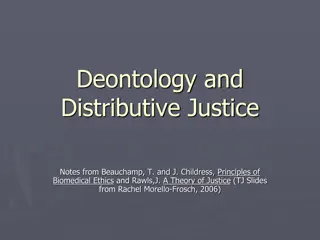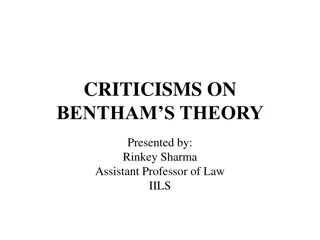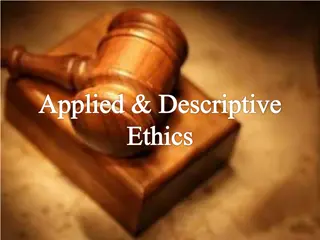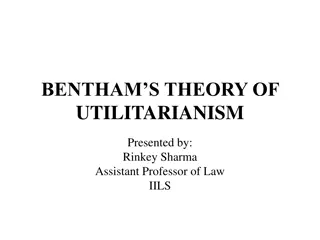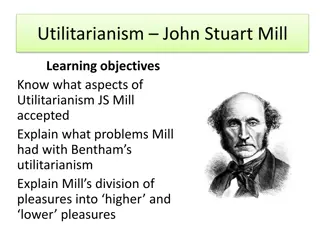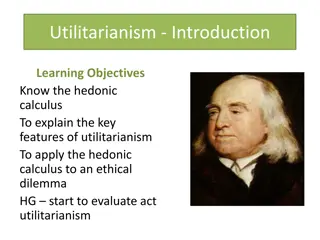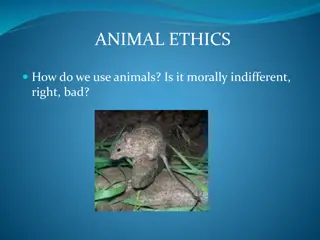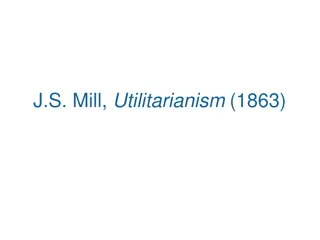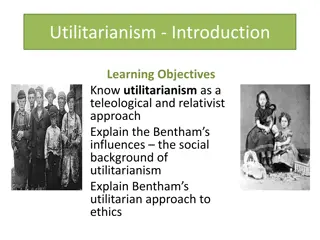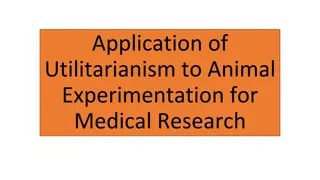Social Studies Notes : Ch. 22 & 23
Explore significant historical events and ideas such as nationalism, industrialism, and political reform. Learn about influential figures like Marie Curie, James Watt, and Simon Bolivar. Understand the impact of the Industrial Revolution and the French Revolution on society. Discover the connections
4 views • 30 slides
Understanding Deontology and Distributive Justice in Ethics
Deontology, originating from the Greek words for duty and study of, focuses on morally required, forbidden, or permitted choices. It emphasizes obedience to duty and opposes utilitarianism, prioritizing what is morally right over the overall good. Unlike virtue theories, deontology assesses moral ob
2 views • 32 slides
Understanding Business Ethics Theories and Principles
Explore various business ethics theories including Ethical Concepts, Moral Behavior Development, Ethical Principles, and the Role of Ethics in Business. Delve into the concept of ethics, moral behavior evolution, ethical principles like autonomy, honesty, justice, and integrity, and the importance o
10 views • 17 slides
Understanding Human Values, Ethics, and Ethical Frameworks
Human values and ethics play a crucial role in guiding individual behavior and decision-making. Human values encompass aspects such as respect, integrity, responsibility, fairness, compassion, honesty, trustworthiness, and cooperation. Ethics provide broader guidelines for determining right and wron
3 views • 7 slides
The Influence of Sir Francis Bacon as an Essayist
Sir Francis Bacon, regarded as the father of English essay, revolutionized the English prose with his profound and objective essays. He emphasized practicality and utilitarianism in his works, offering counsel on leading a successful life. Bacon's essays evolved through multiple editions, showcasing
0 views • 10 slides
Criticisms on Bentham's Utilitarianism Theory
Criticisms of Jeremy Bentham's utilitarianism theory include justifying any crime for the greater pleasure, impracticability due to individual knowledge constraints, neglecting moral consciousness, oversimplifying human nature, and focusing solely on material comforts over spiritual happiness. The t
0 views • 6 slides
Understanding Applied and Descriptive Ethics in Practical Scenarios
Applied ethics focuses on ethical questions in real-life situations and professions, addressing controversial issues like abortion, euthanasia, and more. Philosophers in this field analyze moral problems using ethical theories such as utilitarianism and deontological ethics to make ethical decisions
0 views • 20 slides
Jeremy Bentham's Impact on Political Thought and Utilitarianism
Jeremy Bentham, a notable figure in Anglo-American philosophy of law, was a key proponent of utilitarianism. He emphasized maximizing happiness for the greatest number of people, critiqued laws, and advocated for legal reforms. Bentham's works reflect the societal changes during his time, addressing
0 views • 13 slides
Understanding Bentham's Utilitarianism Theory
Jeremy Bentham, often considered the father of Analytical School of Jurisprudence, introduced Utilitarianism as a guiding principle for law. According to Bentham, the purpose of law is to maximize the overall happiness and minimize pain for the greatest number of people. He developed the concept of
1 views • 7 slides
Jeremy Bentham and Utilitarianism: A Vision for Social Reform
Jeremy Bentham, a prominent philosopher of the 18th and 19th centuries, advocated for utilitarianism, which states that the greatest happiness of the greatest number should be the measure of right and wrong. He proposed the concept of the Panopticon as a new mode of obtaining power over individuals.
2 views • 13 slides
Understanding John Stuart Mill's Utilitarianism: Aspects, Criticisms, and Pleasure Categories
Explore the key aspects of Utilitarianism as proposed by John Stuart Mill, including his acceptance of certain principles, criticisms of Bentham's Utilitarianism, and division of pleasures into higher and lower categories. Delve into the complexities of hedonic calculus, weaknesses of act Utilitaria
0 views • 16 slides
Understanding Human Values, Ethics, and Ethical Frameworks
Human values and ethics play crucial roles in guiding human behavior and decision-making. Values such as respect, integrity, responsibility, fairness, compassion, honesty, trustworthiness, and cooperation are fundamental in shaping individual interactions with others and society. Ethics provide broa
1 views • 7 slides
Understanding Utilitarianism: A Comparative Analysis
Utilitarianism, as introduced by Jeremy Bentham, focuses on maximizing pleasure and minimizing pain to determine the ethical value of actions. Bentham's development of the hedonic calculus and the principle of utility are key components of this consequentialist theory. Influenced by hedonism and dri
0 views • 17 slides
Understanding Utilitarianism and the Principle of Utility
Utilitarianism, as explained by Michael Lacewing, emphasizes that actions are morally right or wrong based on their consequences in maximizing overall happiness. The principle of utility, advocated by Bentham and Mill, guides moral judgments by promoting the greatest happiness for the greatest numbe
0 views • 9 slides
Jeremy Bentham and Utilitarianism
Jeremy Bentham, a late 18th-century British philosopher, introduced Utilitarianism, a moral philosophy focused on maximizing happiness and minimizing pain. He believed that all actions are motivated by pleasure and pain, and that the principle of utility judges actions based on their impact on happi
0 views • 17 slides
Ethical Considerations in Doctor-Patient Communication
The debate on whether a doctor should withhold information from a patient revolves around the principles of autonomy versus beneficence. Various ethical viewpoints such as utilitarianism, libertarianism, Kantian moral imperatives, and Aristotelianism are explored. While some argue for disclosing all
0 views • 25 slides
Understanding Animal Ethics: Perspectives and Philosophies
Exploring the complexities of animal ethics, this content delves into various viewpoints on how we should treat animals, ranging from Stoic and Christian ethics to Immanuel Kant's moral autonomy and utilitarianism. Discussions on moral considerations, duties towards animals, and the importance of co
0 views • 37 slides
Normative Theories of Social and Fiscal Justice in Historical Perspective
The lecture explores normative theories of social and fiscal justice, focusing on social objective functions, utilitarianism, maximin principle, and general social welfare functions. It discusses the challenges of determining social objectives in a world with conflicting values and beliefs, emphasiz
0 views • 24 slides
Understanding Utilitarianism: Consequentialist Ethics in Public Life
Utilitarianism, a consequentialist theory, evaluates the moral worth of actions based on their outcomes. This approach, exemplified by classical utilitarianism of Bentham and Mill, prioritizes maximizing overall happiness or utility. The philosophy emphasizes the principles of consequences, utility,
0 views • 14 slides
Teaching Business Ethics: Perspectives and Decision-Making
Understanding ethics in business involves exploring different perspectives such as Utilitarianism, Rights-Based, Kantian, and Virtue ethics. Decision-making based on these perspectives requires considering the impact on stakeholders, weighing pros and cons, and aligning personal values with organiza
0 views • 8 slides
John Stuart Mill: Philosopher of Liberty and Utilitarianism
John Stuart Mill (1806-1873) was a prominent British philosopher known for his contributions to the principles of liberty and utilitarianism. He advocated for individual freedom and emphasized the importance of self-protection as the justification for societal interference. His work "On Liberty" exp
0 views • 10 slides
Understanding Mill's Utilitarianism and Moral Philosophy
Explore John Stuart Mill's work on Utilitarianism, consequentialism, and hedonistic consequentialism. Discover how moral questions are evaluated based on actions and consequences, and delve into the principle of seeking happiness for sentient beings to determine moral value.
0 views • 23 slides
Understanding J.S. Mill's Justification of Utilitarianism
J.S. Mill's Utilitarianism posits that actions are morally right if they promote happiness and wrong if they lead to unhappiness. Mill's proof of the principle of utility is based on empiricism and the desire for happiness as a desirable end. He argues that happiness is inherently desirable based on
0 views • 20 slides
Understanding Utilitarianism: Bentham's Moral Philosophy
Utilitarianism, a teleological and relativist ethical theory created by Jeremy Bentham, focuses on maximizing happiness and minimizing pain for the greatest number of individuals. Bentham's Act Utilitarianism emphasizes the principle of utility and uses the hedonic calculus to measure pleasure. This
0 views • 20 slides
Ethics of Animal Experimentation in Medical Research
Exploring the application of utilitarianism to animal experimentation for medical research, this content delves into the history of vivisection, animal rights activism, and the work of historical figures like Claudius Galen in advancing medical understanding through dissection. The ethical considera
0 views • 17 slides
Critique of Ethical Schools: A Comparative Analysis
This article explores three main ethical schools - utilitarianism, deontology, and virtue theory - and delves into their distinct emphases and elements. It highlights the differences in how each school views lying and ethical decision-making. Additionally, it discusses the incorporation of ethical p
0 views • 45 slides
Understanding Utilitarianism: Ethics in Public Life Administration
Consequentialist theories in ethics, particularly utilitarianism, emphasize the moral value of actions based on their consequences. Classical utilitarianism by Bentham and Mill focuses on maximizing happiness and pleasure for the greatest number of people. The core principles of utilitarianism inclu
0 views • 14 slides

